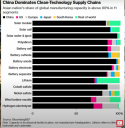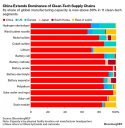China has started mass production of a radioactive isotope widely used in science and medicine, putting the country on the path to ending its near-total reliance on imports. China has been almost totally reliant on imports of the isotope, sourcing supplies from countries including Canada, South Africa, Australia and Russia.
China has started the mass production of carbon-14 through the use of a commercial reactor at Qinshan Nuclear Power Plant, announced its operator on Saturday. With an annual production capacity projected to reach 150 curies of carbon-14, the project is expected to fully meet domestic demand..
“China’s carbon-14 supply has been almost entirely dependent on imports, the price is high and the supply is not guaranteed,” the newspaper reported.
State-owned Science and Technology Daily reported in 2022 that in recent years China had imported more than 90 per cent of medical isotopes and was limited in the variety it could buy.
“It is expected that about 150 curies of carbon-14 isotopes can be produced annually,” state news agency Xinhua quoted plant general manager Shang Xianhe as saying on Saturday. Shang said he expected the output would be enough to “completely meet the market demand” of China.
In addition, the Qinshan plant is simultaneously installing an advanced irradiation isotope production facility that will be able to produce isotopes such as lutetium-177 and yttrium-90, which are also used in medicine.
Meanwhile, construction of the world’s most powerful solution-type medical isotope test reactor also began in January this year in southwest China’s Sichuan province.


